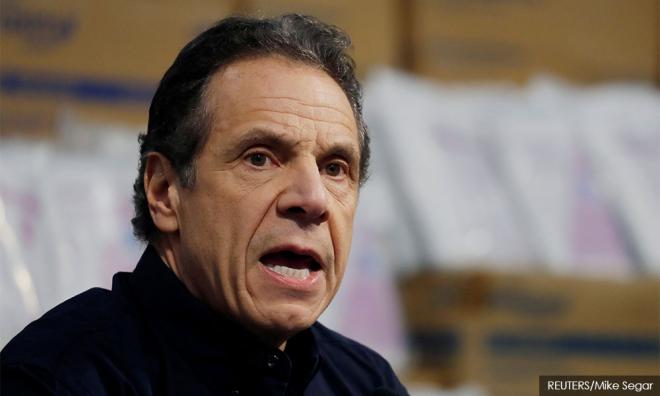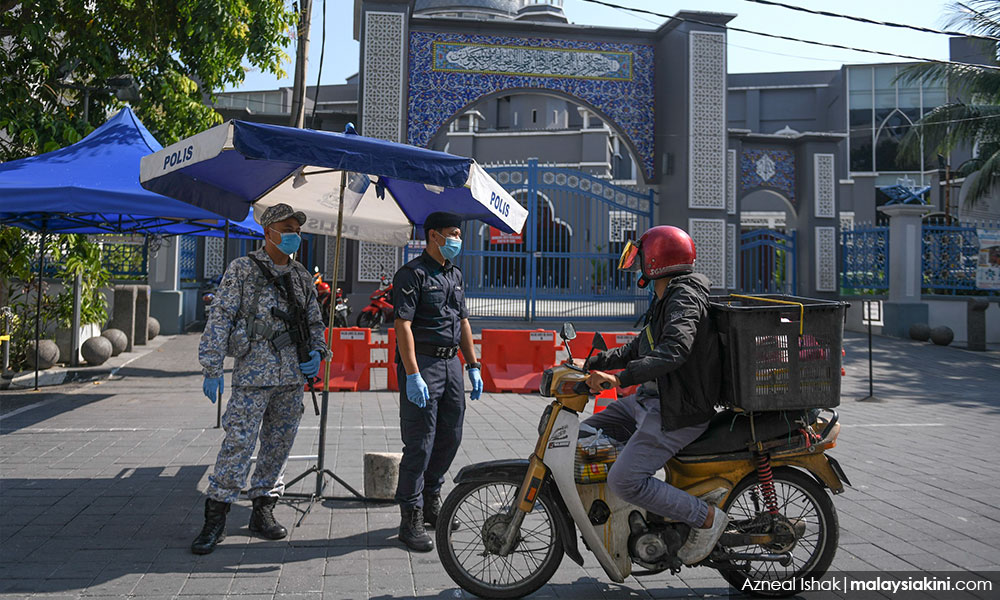
“Life will not be the same when we complete the third (phase) of the MCO. That means we have to comply with certain health regulations so we can reduce the risk of infection.”
- Health director-general Dr Noor Hisham Abdullah on when the movement control order (MCO) would be lifted.
Andrew Cuomo, the embattled governor of New York who is in a pitched battle with the Trump-led federal government, said something extremely important when he discussed opening up New York.
Cuomo (above) said the state will determine which groups of businesses are essential to the economy and which companies are able to protect employees and the public from further spreading the virus.
He said that reopening commerce in his state, and the rest of the country, in the absence of a vaccine for the coronavirus would hinge on testing people for Covid-19 and tracing the contacts of those people who test positive.
“The more testing, the more open the economy,” Cuomo said.
Our Health director-general, meanwhile, said: “What is important is if we are looking at ending the MCO (movement control order), we must have an exit strategy, and among our indicators is the reduction in cases that are still being treated, which is the number of cases still able to infect others or still with a high level of infectiousness.”
While so-called green zones should not be lumped together with the parts of the country grappling with this pandemic, the reality is that one size does not fit all, and hopefully governmental initiatives of opening up the country takes this into consideration.
Testing is the big issue when it comes to the return of some kind of normalisation and Dr Noor Hisham Abdullah has been talking publicly about targeted testing of food delivery riders, foreign workers and religious school students.
However, the reality is that beyond these groups there is a whole range of business and petty traders who are defined as non-essential and who have the possibility of spreading the virus.
Foreign workers who were laid off their jobs at a well-frequented - before the MCO - restaurant told me that they were moving to another town outside Kuala Lumpur because their employer said that he could not afford to pay them anymore.

When it comes to food delivery riders, as reported in the press, Noor Hisham (photo), when questioned about who will pay for the testing, said the matter was under the responsibility of the respective food delivery service companies and that the tests could be performed in either public or private clinics.
“What is certain is that we will encourage them to come to our clinics for screening. For example, if there is a super spreader in a hospital, these delivery riders could be infected when they deliver food there,” he said.
If the MCO is lifted, how many other people are going to lose their jobs if the employers have to pay for testing? Moreover, I am not only talking about foreign workers but anyone employed by companies and small businesses. Or are they exempt from testing?
I told a hardware shop owner who was worried about testing his employees that did he really think all those sundry shop owners were testing their employees and did he really think that the government was monitoring them? This is a scary thought when you think about it.
Dr Jeyakumar Devaraj of PSM related how some workers in factories have reported that they do not have the required PPE and who knows if they have been tested. This makes the idea that strict regulations post-MCO would not be as rigidly enforced, as some would think. It also demonstrates the kind of capitalism at play.
While big companies or politically-connected companies will most probably get a pass, the mom-and-pop outfits would be subjected to stricter regulation and enforcement. Mind you, I am not against stricter regulation and enforcement, merely pointing out the politics in play here.
I live among daily wage earners. Most of them are involved in some form of micro business. Whether working independently or collectively, the main question they ask me, is when do I think life will return to “normal”.
They need the big crowds and freedom of movement to ensure that they scrap together the minimum to pay their monthly debts. The other side of the coin are folks who work for companies that are not deemed “essential”. Most often, these people try to make an argument of why the companies they work for should be defined as essential.
Someone asked me whether politicians are engaged in essential services, because even though they apparently took a pay cut, most of them have all sorts of other revenue streams. Keep in mind that there is a different role for politicians from Perikatan Nasional (PN), where they can get groups of people together if they follow SOP, which does not apply to the average rakyat.

How are we supposed to pay our bills if we cannot work or are restricted in the way how we do business, a trader asked me.
Another middle-class couple, who was told to take no-pay leave, wondered how they were going to pay their utility bills, insurance, car loan repayments, house loans and a whole host of other necessities which they could manage before the pandemic. How safe is it working in an office which does not follow the government guidelines, but which claims it does, they wondered.
The former prime minister in one of his many moments of lunacy told the people that they should monetise their hobbies. This, of course, demonstrates how out of touch the average political potentate is with the folks he or she claims to be championing the cause of race and religion for.
Whenever I talk to political operatives, they too do not have any idea of how the new normal looks like. This is part of the problem. The government should be preparing the public for what the new normal should look like.
However, for most people especially those living a hand to mouth existence, this does not really say anything. What the government needs to do, which they did not really do when they started the MCO, is inform the rakyat of what this new normal would look like.
They need to make the rakyat understand the kind of health regulations, who will pay for them - and most importantly, how these will be enforced.
A husband and wife who used to sell fried noodles in a stall wondered if they could resume selling again after the MCO? They wondered if “prices” would go up and if people could line up to get to their popular stall.
The thing is, with these micro-businesses, all of them involve the gathering of a large number of people. If the new normal means that this is not an option, how will these people make a living?
Meanwhile a local religious operative who spoke to me, was upset because he didn’t know if there would be mosque gatherings after the MCO was lifted. He really is an outlier religious operative because he told me if there was no cure or vaccine, the state Religious Department should ban all forms of religious gatherings. This is something the government should consider, he said. He continued: “They should lift the MCO after Hari Raya because the balik kampung rush will cause more problems.”
A grass cutter who sporadically operated during the MCO was wondering if he should get a test before he resumes working full time or even if he will be allowed to resume working. Sometimes the cops stop him, but sometimes they do not.
“Who will pay for my test?” he asked. He heard that the government gives free testing, but so far he has been unable to get tested. Meanwhile, private healthcare is beyond him and his family.
A cop I usually talk to tells me that he wonders how the health and safety regulations are going to be enforced. He is squatting with some friends because his young wife is pregnant and he does not want to endanger her life.
Someone sent him a text message of a woman who died of the virus but who gave birth to a healthy child. This story has been playing on his mind. He gets extremely upset whenever he sees people defying the MCO. Does this mean, we will have more to do when the MCO is lifted?
The post-MCO is going to be a testing time, in more ways than one.
S THAYAPARAN is Commander (Rtd) of the Royal Malaysian Navy. A retired barrister-at-law, he is one of the founding members of Persatuan Patriot Kebangsaan. - Mkini



No comments:
Post a Comment
Note: Only a member of this blog may post a comment.